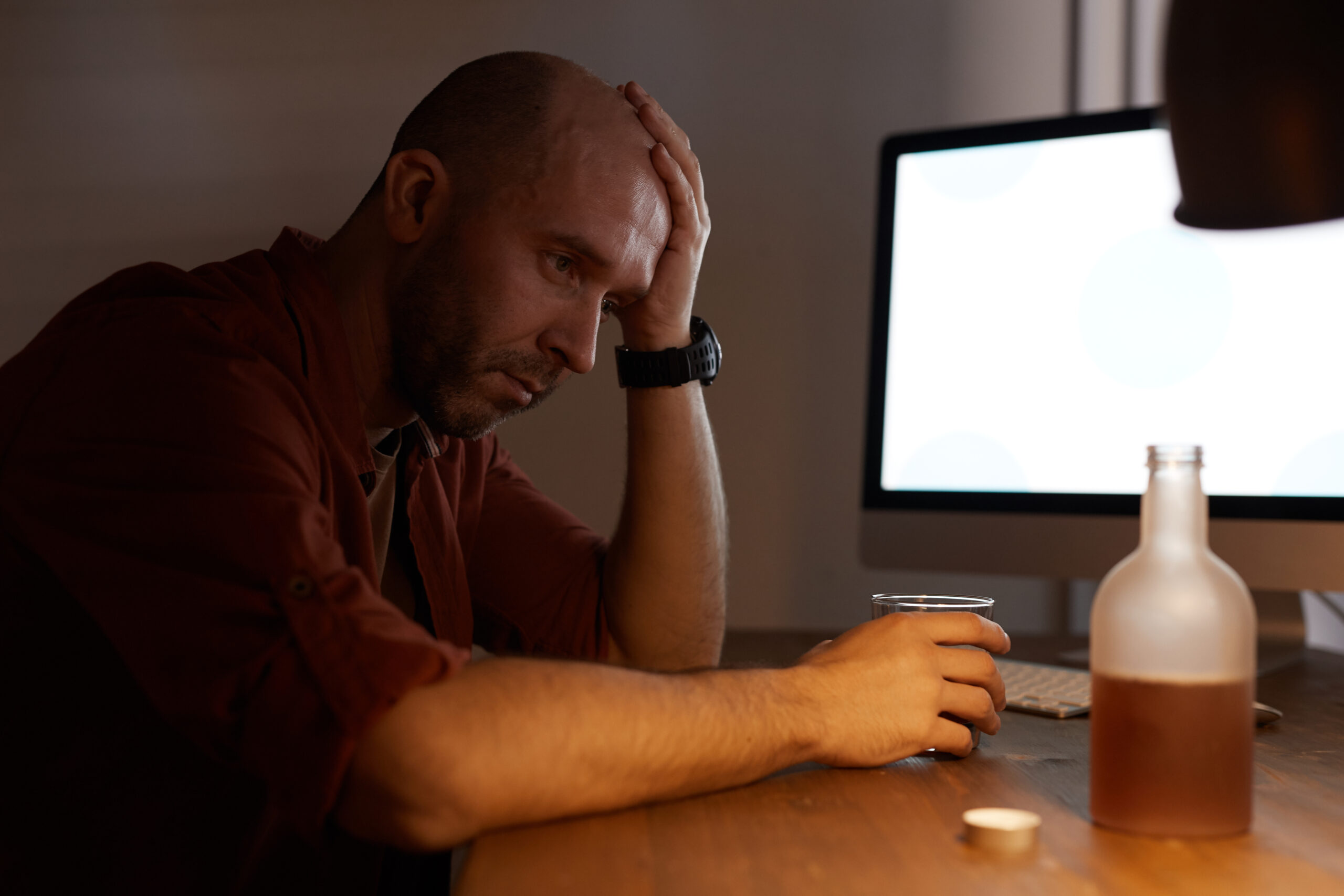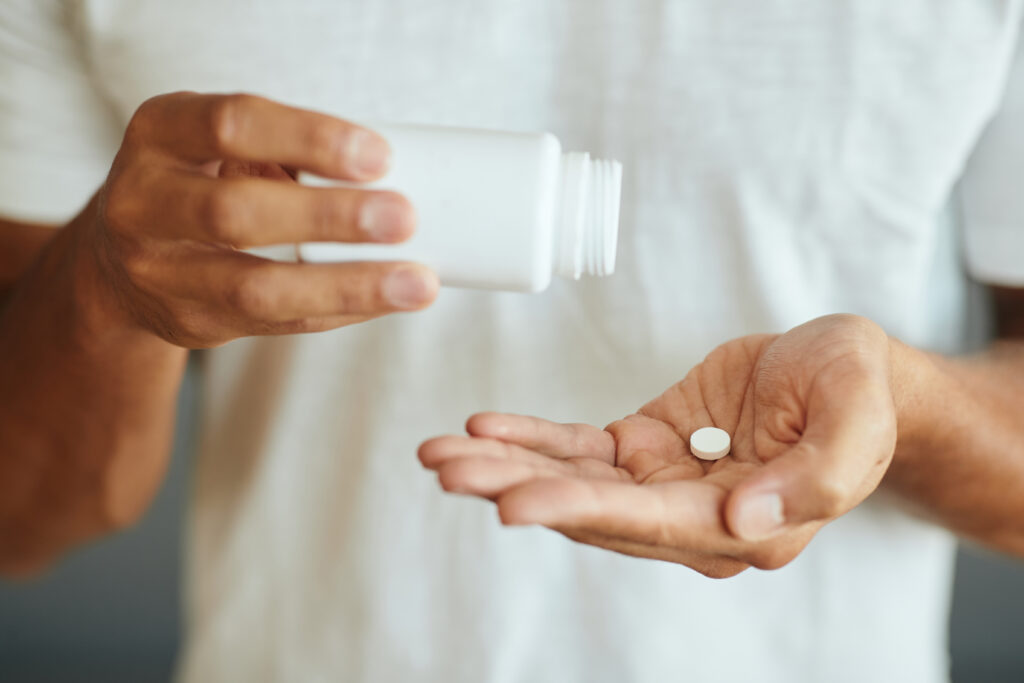Is Alcohol a Depressant or a Stimulant

Alcohol is widely consumed for its euphoric effects. However, many will be surprised to hear that their favourite alcoholic beverage has depressant effects. Alcohol is an addictive psychoactive substance that causes uplifting, stimulant effects in small doses. But it also has depressant effects on the nervous system. So, is alcohol a depressant or stimulant? CCFA explains the difference between stimulants and depressants and why alcohol is considered a depressant.
Key Takeaways
- Alcohol is considered a depressant because of its effects on the central nervous system.
- Alcohol produces euphoric, stimulant effects in small doses, but its depressant effects start to kick in as the dose increases.
- Using alcohol with depressant medications can intensify its depressant effects and lead to severe adverse consequences.
What is a Depressant?

Due to the name, one may think that a depressant makes you sad or emotionally down. Rather, a depressant is a substance that inhibits or slows down the central nervous system. Depressants, also known as downers, cause slower brain activity, making you feel calm and relaxed. They slow the heart rate, respiration, and gastrointestinal system to produce the associated feelings of sedation and calmness. Examples of depressants include prescription drugs like benzodiazepines and barbiturates.
Misusing or taking higher than prescribed amounts of a depressant can lead to side effects like confusion, poor coordination, low blood pressure, delayed reflexes, and impaired vision. Alcohol also slows down brain activity, even though it provides an initial mood boost. The more alcohol a person consumes, the harder it becomes to experience the associated euphoria and feel-good effects. Using alcohol with depressant medication also intensifies alcohol depressant effects and can lead to more severe side effects.
If you or a loved one is struggling with alcohol abuse, the Canadian Centre for Addiction can help. We offer sophisticated alcohol abuse and addiction treatment that help individuals begin their journey to recovery.
How Do Depressants Work?
Depressants act on the brain by increasing the activity of gamma-aminobutyric acid (GABA), a neurotransmitter that inhibits brain activity and transmits signals between cells. Increased GABA action decreases brain activity, leading to a calm and relaxed state. People who start using depressants may feel drowsy or uncoordinated till their body adjusts to the medication. Depressant misuse may cause the following:
- Confusion and disorientation
- Dizziness
- Poor coordination
- Slurred speech
- Loss of memory
- Headaches
- Lightheadedness
- Reduced heart rate
Depressants also carry a high abuse potential, and long-term use of these drugs can lead to tolerance, dependence, and addiction. A person with a depressant addiction may experience unpleasant withdrawal symptoms if they try to stop using it.
What is the Difference Between Stimulants and Depressants
Stimulants and depressants are two drug classes that affect the nervous system differently. Both drug classes carry a high potential for abuse and dependence. Stimulants activate the nervous system and speed up brain activity, causing aggression, improved alertness, and higher energy levels. They also increase blood pressure, heart rate, and respiration.
Stimulants produce a euphoric rush that makes them prone to abuse. At high doses, stimulants can lead to dangerous side effects like seizures, arrhythmia, hyperthermia, and heart failure. Examples of stimulants include amphetamines, cocaine, methadone, nicotine, and adrenaline.
Depressants act by slowing the nervous system and reducing brain activity. They lower brain awareness and bring on feelings of relaxation and calmness. Depressants are generally used to treat anxiety, stress reactions, insomnia, panic disorders, and muscle spasms. Examples of depressants include barbiturates, hypnotics, and benzodiazepines.
Why is Alcohol Considered a Depressant?
So, is alcohol an upper or a downer? It’s considered a depressant due to its actions on the central nervous system. When you take alcohol, your brain activity is lowered as GABA effects are amplified. Alcohol consumption distorts your perception of reality and diminishes your ability to think. It also lowers your inhibitions and affects your judgment. In a nutshell, alcohol is a central nervous system (CNS) depressant because it reduces brain stimulation. Overuse of alcohol will slow the nervous system so much that respiration and heart rate can be affected. To find out more, take a look at our guide on whether alcohol is a drug.
In What Cases Can Alcohol Be Considered a Stimulant
Alcohol is a depressant but produces significant stimulant action in initial, small doses. When you first consume alcohol, it triggers the release of dopamine – a neurotransmitter that regulates pleasure and motivation. Alcohol also increases blood pressure and heart rate in low doses. However, the extent of these effects depends on personal factors like age, sex, weight, body chemistry, and alcohol tolerance levels. Alcohol stimulant effects increase as blood alcohol concentration (BAC) approaches 0.05mg/L. However, its depressant effects will start to kick in when BAC reaches around 0.08mg/L.
What are the Depressant Side Effects of Alcohol?

The depressant side effects of alcohol you’ll experience depend on how much and how fast you drink. Other factors like genetics, body size, gender, and alcohol tolerance level influence how quickly you’ll begin to experience these effects. Common depressant side effects of alcohol include:
- Low blood pressure
- Loss of coordination
- Headaches
- Blurred vision
- Nausea and vomiting
- Delayed reflexes
- Dizziness
- Impaired mental function
- Memory loss
- Loss of consciousness
- Slowed respiration
In severe cases, alcohol overuse can lead to alcohol poisoning, respiratory failure, coma, or death. Long-term alcohol use can cause organ failure, clinical depression, cardiovascular disorders, and chronic health conditions.
People who abuse alcohol may also experience non-physical consequences such as job loss, wrecked finances, and damaged relationships.
Treating the “Downer” Side Effects of Alcohol
Alcohol and other substances with depressant effects are commonly known as downers, while stimulants are known as uppers for their mood-boosting properties. The downer side effects of alcohol will pass as the alcohol clears from your system, but the associated loss of inhibition and impaired judgement can cause far-reaching and lasting effects.
People who misuse alcohol or have alcohol use disorder may need to consult a mental health expert to help them determine the best treatment course. Treatment options include:
Medications
Drugs like naltrexone, acamprosate, and disulfiram may be prescribed to reduce alcohol cravings or reduce withdrawal symptoms. These drugs inhibit the brain’s reward system, making drinking less enjoyable with time.
Therapy
Several therapeutic programs are available for people dealing with the effects of alcohol use. They include individual or group counselling, family therapy, individual counselling, and cognitive behavioural therapy. Support groups like Alcoholics Anonymous (AA) and Self-Management and Recovery Training (SMART) may also help people deal with the effects of alcohol misuse.
When to Consult a Medical Professional
You know it’s time to get professional help for alcohol use if you notice the following:
- Continued alcohol use in increasing amounts
- Trying and failing to stop using alcohol
- Having intense cravings to drink alcohol
- Spending a great deal of time drinking and recovering from the effects of alcohol
- Decreased productivity at work or school due to alcohol use
- Continued alcohol use despite negative consequences on one’s health
- Needing increased amounts to get the same alcohol effects – tolerance
- Becoming alcohol-dependent: unable to go about your daily activities without alcohol
- Experiencing withdrawal symptoms upon cessation or reduction of alcohol use
Conclusion
Alcohol is considered a depressant due to its action on the central nervous system and not because it necessarily makes you depressed. However, people who abuse or are addicted to alcohol have a high risk of developing depression. Depressed people may also turn to alcohol as a coping mechanism or means of self-medication.
If you or a loved one has an unhealthy relationship with alcohol, it’s vital to seek professional help immediately. The Canadian Centre for Addictions offers alcohol addiction treatment in an environment that inspires lasting change. We help our clients understand their addictions and the healthier coping strategies available by engaging them in one-on-one counselling with certified counsellors, psychiatrists, and mental health professionals. Call 1-855-499-9446 to learn more about how we treat problems related to alcohol abuse and alcohol use disorder.
Frequently Asked Questions
Nicotine acts as both a stimulant and a depressant to the central nervous system. It stimulates the central nervous system by triggering the release of adrenaline, which further stimulates the nervous system and is responsible for the associated feelings of pleasure. Nicotine also promotes the release of beta-endorphins, which inhibit pain and replace the stimulation with fatigue and a drop in mood. This mood change causes the user to seek more nicotine, potentially starting a cycle of nicotine abuse and addiction.
Yes. Alcohol can cause new anxiety symptoms or worsen an already existing anxiety disorder. Existing anxiety can also cause a person to develop alcohol use disorder, particularly if they use alcohol to cope with their symptoms.
Yes. This study shows that any amount of alcohol consumed before bedtime can impact the quality of your sleep.
No. Alcoholics have a higher alcohol tolerance and will need to drink more to feel intoxicated.
No amount of alcohol use is safe. But to reduce the risk of alcohol-related harm, men should consume no more than two drinks per day, while women should stick to one drink per day.





